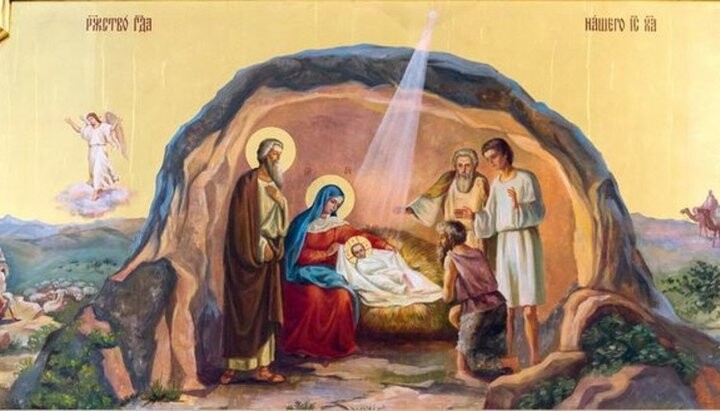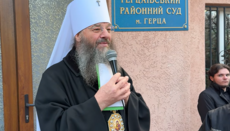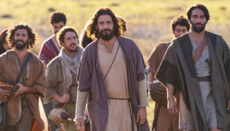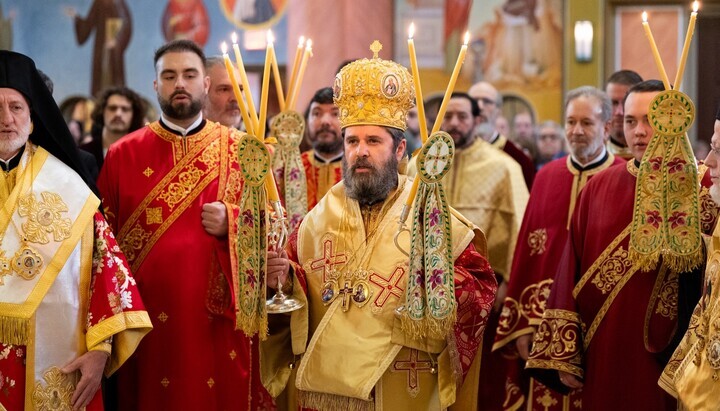The Church celebrates the Nativity of Christ

On January 7, the Orthodox Church celebrates the great feast of the Nativity of our Lord, God, and Savior Jesus Christ.
Our Lord Jesus Christ, the Savior of the world, was born of the Most Holy Virgin Mary during the reign of Emperor Augustus (Octavian) in the city of Bethlehem.
Augustus had decreed a census across his empire, which at the time included Palestine. Among the Jews, it was customary to conduct censuses according to tribes, clans, and families, with each having designated ancestral towns and locations. Therefore, the Blessed Virgin and the righteous Joseph, both descendants of the house of David, traveled to Bethlehem (the city of David) to register their names as subjects of the emperor.
In Bethlehem, they found no available lodging in the town’s inns. In a limestone cave used as a stable, amidst hay and straw scattered for feeding and bedding livestock, far from their home, among strangers, on a cold winter’s night, in circumstances devoid of earthly grandeur or even basic comfort, the God-Man, the Savior of the world, was born.
“I behold a strange and wondrous mystery,” exclaims the Holy Church in awe. “Heaven is a cave, the Cherubic Throne – the Virgin, the manger – a dwelling place, in which Christ, the Uncontainable God, lies” (Irmos, 9th Ode of the Canon). The Most Holy Virgin, who bore the Infant Christ without pain, swaddled Him herself and laid Him in a manger (Luke 2:7).
Yet, in the silence of midnight, when humanity was lost in the depths of sinful slumber, the news of the Savior’s birth reached shepherds keeping watch over their flocks. An angel of the Lord appeared to them and said, “Fear not, for behold, I bring you good tidings of great joy, which shall be to all people. For unto you is born this day a Savior, who is Christ the Lord, in the city of David.” These humble shepherds were the first to bow before Him who, for the sake of saving humanity, took on “the form of a servant.”
Beyond the angelic proclamation to the shepherds of Bethlehem, the Nativity of Christ was also revealed by a miraculous star to the Magi – “stargazers.” Through these wise men from the East, the pagan world, unknowingly, bent its knee to the true Savior of the world, the God-Man. Entering the dwelling where the Child lay, the Magi “fell down and worshipped Him, and opening their treasures, they offered Him gifts: gold, frankincense, and myrrh” (Matthew 2:11).
In remembrance of the Nativity in the flesh of our Lord Jesus Christ, the Church established this feast, whose origins trace back to the time of the Apostles.
In the 3rd century, St. Hippolytus of Rome mentioned the Nativity as a traditional feast, prescribing the reading of the Gospel of Matthew’s first chapter on this day.
During the persecution of Christians by Emperor Maximian in 302 AD, twenty thousand Christians of Nicomedia were burned in their church on the very day of the Nativity.
In the same century, after the persecution ceased and Christianity became the dominant faith of the Roman Empire, the Nativity of Christ was celebrated universally, as evident from the sermons of St. Ephraim the Syrian, St. Basil the Great, St. Gregory the Theologian, St. Gregory of Nyssa, St. Ambrose, St. John Chrysostom, and other Fathers of the Church in the 4th century.
St. John Chrysostom, in his homily from 385 AD, referred to the Nativity as an ancient feast. In that same century, Equal-to-the-Apostles Empress Helena built a magnificent church on the site of the Bethlehem cave, which was further adorned by her son, Emperor Constantine the Great.
In the Theodosian Code (438 AD) and Justinian's Codex (535 AD), laws were issued mandating the universal celebration of the Nativity. Byzantine historian Nikephoros Callistos of the 14th century even noted that Emperor Justinian in the 6th century instituted the observance of the Nativity across the world.
Over the centuries, numerous sacred hymns were composed for the feast by notable figures like Patriarch Anatolios of Constantinople in the 5th century, St. Sophronius and St. Andrew of Jerusalem in the 7th century, and St. John Damascene, Cosmas of Maiuma, and Patriarch Germanus of Constantinople in the 8th century. These hymns, along with others of unknown authorship, continue to be sung by the Church to glorify this radiant event.
In the first three centuries, due to the constraints of persecution, some Eastern churches – such as those in Jerusalem, Antioch, Alexandria, and Cyprus – celebrated the Nativity and Theophany together on January 6 under the single name of "Theophany." This practice arose partly from the belief that Christ was baptized on the day of His birth, as suggested by St. John Chrysostom: “The day Christ was born is not called Theophany, but the day He was baptized.”
This practice persisted in some Eastern Churches until the 4th, 5th, or even 6th century. A vestige of this ancient tradition remains in the Orthodox Church today through the liturgical similarities between the feasts of the Nativity and Theophany.
Both feasts are preceded by a vigil, with the shared tradition of fasting until the first star appears. The liturgical structure of the services for the vigil and the feasts themselves is nearly identical.
The Nativity of Christ has long been counted among the twelve great feasts of the Church, in accordance with the divine testimony of the Gospel.
This extraordinary event was accompanied by wondrous announcements to shepherds and Magi of the universal joy for all humanity, “for a Savior is born.” Angels sang praises to the newborn Savior, shepherds and Magi worshipped Him, and those who heard the shepherds’ words about the Child marveled. Glory and praise filled the hearts of those who witnessed the miracle.
In harmony with the Gospel’s divine testimony, the Fathers of the Church describe the Nativity of Christ as a universal and joyous celebration, laying the foundation for all other feasts.
Previously, the UOJ reported that His Beatitude Metropolitan Onuphry extended his Christmas greetings to the Ukrainian faithful.











